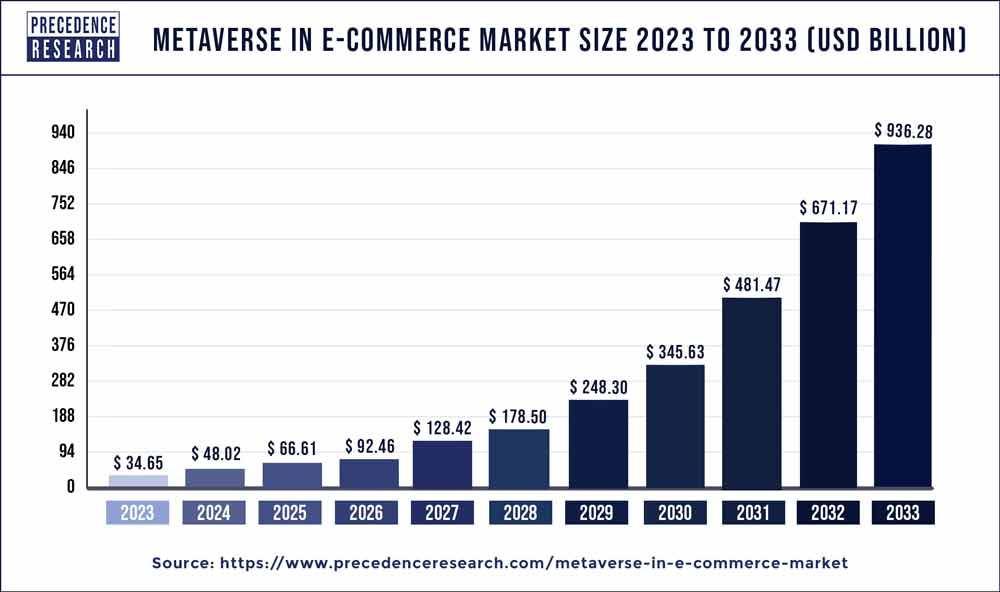The metaverse in e-commerce market size is poised to grow by USD 936.28 billion by 2033 from USD 34.65 billion in 2023, exhibiting a CAGR of 39.1% during the forecast period 2024 to 2033.
Key Takeaways
- North America contributed more than 40% of market share in 2023.
- Asia-Pacific is estimated to expand the fastest CAGR between 2024 and 2033.
- By platform, the computer segment has held the largest market share of 36% in 2023.
- By platform, the headset segment is anticipated to grow at a remarkable CAGR of 40.12% between 2024 and 2033.
- By technology, the AR and VR segment generated over 37% market share in 2023.
- By technology, the mixed reality segment is expected to expand at the fastest CAGR over the projected period.

The integration of the metaverse with e-commerce is a groundbreaking development that envisions a digital, immersive space where users can engage in shopping experiences beyond the traditional online platforms. This fusion aims to transform the way consumers interact with products and services, creating a virtual marketplace with enhanced user engagement.
Get a Sample Report: https://www.precedenceresearch.com/sample/3689
Growth Factors
The metaverse in e-commerce is poised for substantial growth due to the increasing adoption of virtual reality (VR) and augmented reality (AR) technologies. These technologies offer a more immersive and interactive shopping experience, attracting consumers seeking novel ways to explore and purchase products. Additionally, the metaverse fosters social interactions, providing opportunities for users to share their shopping experiences, influencing the buying behavior of others.
Metaverse in E-commerce Market Scope
| Report Coverage | Details |
| Growth Rate from 2024 to 2033 | CAGR of 39.10% |
| Global Market Size in 2023 | USD 34.65 Billion |
| Global Market Size by 2033 | USD 936.28 Billion |
| U.S. Market Size in 2023 | USD 9.70 Billion |
| U.S. Market Size by 2033 | USD 264.05 Billion |
| Base Year | 2023 |
| Forecast Period | 2024 to 2033 |
| Segments Covered | By Platform and By Technology |
| Regions Covered | North America, Europe, Asia-Pacific, Latin America, and Middle East & Africa |
Read More: Industrial Metaverse Market Size To Gain USD 339.06 Bn by 2033
Opportunities
The metaverse opens up new avenues for innovative business models within e-commerce. Virtual storefronts, personalized avatars for users, and virtual try-on experiences are among the opportunities that can revolutionize the way products are showcased and marketed. Brands have the chance to create unique, immersive environments that can significantly enhance their digital presence and customer engagement.
Challenges
Despite the potential, integrating the metaverse into e-commerce faces challenges. Technical barriers, such as the need for high-quality VR and AR devices, may limit widespread adoption. Privacy and security concerns also come to the forefront, as users navigate immersive digital spaces. Moreover, ensuring a seamless transition from traditional e-commerce to the metaverse presents logistical and strategic challenges for businesses.
Metaverse in E-commerce Market Companies
- Facebook (Meta)
- Amazon
- Microsoft
- NVIDIA
- Unity Technologies
- Epic Games
- Decentraland
- Roblox Corporation
- Shopify
- Alibaba Group
- Tencent Holdings
- Magic Leap
- HTC Corporation
- Samsung Electronics
Data Sources and Methodology
To gather comprehensive insights on the Global Metaverse in e-commerce Market, we relied on a range of data sources and followed a well-defined methodology. Our approach involved interactions with industry experts and key stakeholders across the market’s value chain, including management organizations, processing organizations, and analytics service providers.
We followed a rigorous data analysis process to ensure the quality and credibility of our research. The gathered information was carefully evaluated, and relevant quantitative data was subjected to statistical analysis. By employing robust analytical techniques, we were able to derive meaningful insights and present a comprehensive overview of the Global Metaverse in e-commerce Market.
The most resonating, simple, genuine, and important causes because of which you must decide to buy the Metaverse in e-commerce market report exclusively from precedence research
- The research report has been meticulously crafted to provide comprehensive knowledge on essential marketing strategies and a holistic understanding of crucial marketing plans spanning the forecasted period from 2023 to 2032.
Key Features of the Report:
- Comprehensive Coverage: The report extensively encompasses a detailed explanation of highly effective analytical marketing methods applicable to companies across all industry sectors.
- Decision-Making Enhancement: It outlines a concise overview of the decision-making process while highlighting key techniques to enhance it, ensuring favorable business outcomes in the future.
- Articulated R&D Approach: The report presents a well-defined approach to conducting research and development (R&D) activities, enabling accurate data acquisition on current and future marketing conditions.
Market Segmentation:
By Platform
- Computer
- Mobile
- Headset
By Technology
- AR and VR
- Blockchain
- Mixed reality
- Others
By Geography
- North America
- Europe
- Asia-Pacific
- Latin America
- Middle East and Africa
Reasons to Consider Purchasing the Report:
- Enhance your market research capabilities by accessing this comprehensive and precise report on the global Metaverse in e-commerce market.
- Gain a thorough understanding of the overall market landscape and be prepared to overcome challenges while ensuring robust growth.
- Benefit from in-depth research and analysis of the latest trends shaping the global Metaverse in e-commerce market.
- Obtain detailed insights into evolving market trends, current and future technologies, and strategic approaches employed by key players in the global Metaverse in e-commerce market.
- Receive valuable recommendations and guidance for both new entrants and established players seeking further market expansion.
- Discover not only the cutting-edge technological advancements in the global Metaverse in e-commerce market but also the strategic plans of industry leaders.
Table of Content
Chapter 1. Introduction
1.1. Research Objective
1.2. Scope of the Study
1.3. Definition
Chapter 2. Research Methodology (Premium Insights)
2.1. Research Approach
2.2. Data Sources
2.3. Assumptions & Limitations
Chapter 3. Executive Summary
3.1. Market Snapshot
Chapter 4. Market Variables and Scope
4.1. Introduction
4.2. Market Classification and Scope
4.3. Industry Value Chain Analysis
4.3.1. Raw Material Procurement Analysis
4.3.2. Sales and Distribution Channel Analysis
4.3.3. Downstream Buyer Analysis
Chapter 5. COVID 19 Impact on Metaverse in E-commerce Market
5.1. COVID-19 Landscape: Metaverse in E-commerce Industry Impact
5.2. COVID 19 – Impact Assessment for the Industry
5.3. COVID 19 Impact: Global Major Government Policy
5.4. Market Trends and Opportunities in the COVID-19 Landscape
Chapter 6. Market Dynamics Analysis and Trends
6.1. Market Dynamics
6.1.1. Market Drivers
6.1.2. Market Restraints
6.1.3. Market Opportunities
6.2. Porter’s Five Forces Analysis
6.2.1. Bargaining power of suppliers
6.2.2. Bargaining power of buyers
6.2.3. Threat of substitute
6.2.4. Threat of new entrants
6.2.5. Degree of competition
Chapter 7. Competitive Landscape
7.1.1. Company Market Share/Positioning Analysis
7.1.2. Key Strategies Adopted by Players
7.1.3. Vendor Landscape
7.1.3.1. List of Suppliers
7.1.3.2. List of Buyers
Chapter 8. Global Metaverse in E-commerce Market, By Platform
8.1. Metaverse in E-commerce Market, by Platform, 2024-2033
8.1.1. Computer
8.1.1.1. Market Revenue and Forecast (2021-2033)
8.1.2. Mobile
8.1.2.1. Market Revenue and Forecast (2021-2033)
8.1.3. Headset
8.1.3.1. Market Revenue and Forecast (2021-2033)
Chapter 9. Global Metaverse in E-commerce Market, By Technology
9.1. Metaverse in E-commerce Market, by Technology, 2024-2033
9.1.1. AR and VR
9.1.1.1. Market Revenue and Forecast (2021-2033)
9.1.2. Blockchain
9.1.2.1. Market Revenue and Forecast (2021-2033)
9.1.3. Mixed reality
9.1.3.1. Market Revenue and Forecast (2021-2033)
9.1.4. Others
9.1.4.1. Market Revenue and Forecast (2021-2033)
Chapter 10. Global Metaverse in E-commerce Market, Regional Estimates and Trend Forecast
10.1. North America
10.1.1. Market Revenue and Forecast, by Platform (2021-2033)
10.1.2. Market Revenue and Forecast, by Technology (2021-2033)
10.1.3. U.S.
10.1.3.1. Market Revenue and Forecast, by Platform (2021-2033)
10.1.3.2. Market Revenue and Forecast, by Technology (2021-2033)
10.1.4. Rest of North America
10.1.4.1. Market Revenue and Forecast, by Platform (2021-2033)
10.1.4.2. Market Revenue and Forecast, by Technology (2021-2033)
10.2. Europe
10.2.1. Market Revenue and Forecast, by Platform (2021-2033)
10.2.2. Market Revenue and Forecast, by Technology (2021-2033)
10.2.3. UK
10.2.3.1. Market Revenue and Forecast, by Platform (2021-2033)
10.2.3.2. Market Revenue and Forecast, by Technology (2021-2033)
10.2.4. Germany
10.2.4.1. Market Revenue and Forecast, by Platform (2021-2033)
10.2.4.2. Market Revenue and Forecast, by Technology (2021-2033)
10.2.5. France
10.2.5.1. Market Revenue and Forecast, by Platform (2021-2033)
10.2.5.2. Market Revenue and Forecast, by Technology (2021-2033)
10.2.6. Rest of Europe
10.2.6.1. Market Revenue and Forecast, by Platform (2021-2033)
10.2.6.2. Market Revenue and Forecast, by Technology (2021-2033)
10.3. APAC
10.3.1. Market Revenue and Forecast, by Platform (2021-2033)
10.3.2. Market Revenue and Forecast, by Technology (2021-2033)
10.3.3. India
10.3.3.1. Market Revenue and Forecast, by Platform (2021-2033)
10.3.3.2. Market Revenue and Forecast, by Technology (2021-2033)
10.3.4. China
10.3.4.1. Market Revenue and Forecast, by Platform (2021-2033)
10.3.4.2. Market Revenue and Forecast, by Technology (2021-2033)
10.3.5. Japan
10.3.5.1. Market Revenue and Forecast, by Platform (2021-2033)
10.3.5.2. Market Revenue and Forecast, by Technology (2021-2033)
10.3.6. Rest of APAC
10.3.6.1. Market Revenue and Forecast, by Platform (2021-2033)
10.3.6.2. Market Revenue and Forecast, by Technology (2021-2033)
10.4. MEA
10.4.1. Market Revenue and Forecast, by Platform (2021-2033)
10.4.2. Market Revenue and Forecast, by Technology (2021-2033)
10.4.3. GCC
10.4.3.1. Market Revenue and Forecast, by Platform (2021-2033)
10.4.3.2. Market Revenue and Forecast, by Technology (2021-2033)
10.4.4. North Africa
10.4.4.1. Market Revenue and Forecast, by Platform (2021-2033)
10.4.4.2. Market Revenue and Forecast, by Technology (2021-2033)
10.4.5. South Africa
10.4.5.1. Market Revenue and Forecast, by Platform (2021-2033)
10.4.5.2. Market Revenue and Forecast, by Technology (2021-2033)
10.4.6. Rest of MEA
10.4.6.1. Market Revenue and Forecast, by Platform (2021-2033)
10.4.6.2. Market Revenue and Forecast, by Technology (2021-2033)
10.5. Latin America
10.5.1. Market Revenue and Forecast, by Platform (2021-2033)
10.5.2. Market Revenue and Forecast, by Technology (2021-2033)
10.5.3. Brazil
10.5.3.1. Market Revenue and Forecast, by Platform (2021-2033)
10.5.3.2. Market Revenue and Forecast, by Technology (2021-2033)
10.5.4. Rest of LATAM
10.5.4.1. Market Revenue and Forecast, by Platform (2021-2033)
10.5.4.2. Market Revenue and Forecast, by Technology (2021-2033)
Chapter 11. Company Profiles
11.1. Facebook (Meta)
11.1.1. Company Overview
11.1.2. Product Offerings
11.1.3. Financial Performance
11.1.4. Recent Initiatives
11.2. Google
11.2.1. Company Overview
11.2.2. Product Offerings
11.2.3. Financial Performance
11.2.4. Recent Initiatives
11.3. Amazon
11.3.1. Company Overview
11.3.2. Product Offerings
11.3.3. Financial Performance
11.3.4. Recent Initiatives
11.4. Microsoft
11.4.1. Company Overview
11.4.2. Product Offerings
11.4.3. Financial Performance
11.4.4. Recent Initiatives
11.5. NVIDIA
11.5.1. Company Overview
11.5.2. Product Offerings
11.5.3. Financial Performance
11.5.4. Recent Initiatives
11.6. Unity Technologies
11.6.1. Company Overview
11.6.2. Product Offerings
11.6.3. Financial Performance
11.6.4. Recent Initiatives
11.7. Epic Games
11.7.1. Company Overview
11.7.2. Product Offerings
11.7.3. Financial Performance
11.7.4. Recent Initiatives
11.8. Decentraland
11.8.1. Company Overview
11.8.2. Product Offerings
11.8.3. Financial Performance
11.8.4. Recent Initiatives
11.9. Roblox Corporation
11.9.1. Company Overview
11.9.2. Product Offerings
11.9.3. Financial Performance
11.9.4. Recent Initiatives
11.10. Shopify
11.10.1. Company Overview
11.10.2. Product Offerings
11.10.3. Financial Performance
11.10.4. Recent Initiatives
Chapter 12. Research Methodology
12.1. Primary Research
12.2. Secondary Research
12.3. Assumptions
Chapter 13. Appendix
13.1. About Us
13.2. Glossary of Terms
Unlocking Market Insights through Data Excellence
The “Precedence Statistics” flexible dashboard is a powerful tool that offers real-time news updates, economic and market forecasts, and customizable reports. It can be configured to support a wide range of analysis styles and strategic planning needs. This tool empowers users to stay informed and make data-driven decisions in various scenarios, making it a valuable asset for businesses and professionals looking to stay ahead in today’s dynamic and data-driven world.
Access our Premium Real Time Data Intelligence Tool, Visit: www.precedencestatistics.com
Precedence Statistics – Empowering Your Data Insights
Contact Us
Precedence Research
Apt 1408 1785 Riverside Drive Ottawa, ON, K1G 3T7, Canada
Call: +1 9197 992 333
Email: sales@precedenceresearch.com
